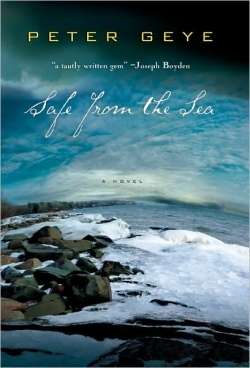Safe from the Sea
Secrets corrode and divide; truths heal and unite. This concept is gracefully explored in first-time novelist Peter Geye’s lyric story of familial strife and re-conciliation, Safe from the Sea.
Called home by his dying father after years of silence, antique map dealer Noah Torr reluctantly returns from Boston to his childhood haunts in northern Minnesota. As Noah drives through Duluth, Geye writes that “[t]he manholes blowing steam might have been freeing ghosts,” a lovely description that also serves as a metaphor for the experiences Noah has upon reaching his father’s cabin. Deeply buried memories, questions, and resentments float to the surface where they must be dealt with.
In addition to helping his ever-weakening father wrap up life’s loose ends, Noah tries to understand why his father emotionally abandoned him, his mother, and his sister decades earlier. Complicating matters, Noah and his wife have been trying to have a child and, just when Noah leaves to be with his father, his wife is ovulating and fears they will miss what may be their last chance to conceive.
Much of the novel revolves around the 1967 sinking of the Ragnarok, a Lake Superior ore ship. Olaf (Noah’s father) was one of three men who survived the wreck while nearly thirty others died. It was after this tragedy that Olaf pulled away from his family. The story of the sinking is told through various means—pictures at a museum, transcripts of communications from the sinking ship—but mostly through the stories Olaf tells about what went wrong on board the ship and the guilty secrets about it he has subsequently harbored.
Geye excels at capturing the importance of life’s seemingly small moments and at cataloging their beauty. Though his characters sometimes verge on clichés (the gruff sailor, or the yuppie), he successfully veers away from such simplistic depictions, always giving them more complex dimensionality and emotional existences. Perhaps most importantly, Geye shows how love is often revealed in nearly invisible ways. When Olaf asks Noah to put another log on the fire, for instance, even though Noah knows it “wouldn’t make any difference,” he does it anyway just to make his father happy. Where lesser authors might employ melodrama and petty conflict to interest readers, Geye shows how relationships—however flawed the participants—can be salvaged and strengthened when people strive to make things work through understanding and the search for and sharing of the truth.
Reviewed by
Rob Baker
Disclosure: This article is not an endorsement, but a review. The publisher of this book provided free copies of the book to have their book reviewed by a professional reviewer. No fee was paid by the publisher for this review. Foreword Reviews only recommends books that we love. Foreword Magazine, Inc. is disclosing this in accordance with the Federal Trade Commission’s 16 CFR, Part 255.

